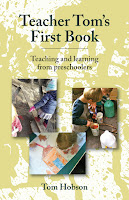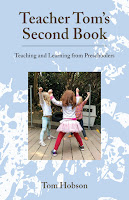We didn't have a huge set of big wooden blocks, which was okay because we didn't really have enough space for more and besides, if the kids are going to play with them, they generally needed to find a way to play with them together, which is what our school was all about.
The kids in our 4-5's class had been playing a lot of "super heroes." It was mostly boys, but they hadn't been particularly exclusionary, with several of the girls regularly joining them, often making up their own hero names like "Super Cat" due to the lack of female characters of the type in our popular culture. This in turn inspired some of the boys to make up their own hero names like "Super Dog" and "Falcon," along with their own super powers. And although there had been a few instances of someone declaring, "We already have enough super heroes," in an attempt to close the door behind them, most of the time, the prerequisite for joining the play was to simply declare yourself a super hero, pick a super hero name, and then hang around with them boasting about your great might, creating hideouts, and bickering over nuance.
At one point, however, a break-away group began playing, alternatively, Paw Patrol and Pokemon, which looked to me like essentially the same game with new characters. One day, some boys playing Paw Patrol used all of the big wooden blocks to create their "house," complete with beds and blankets. A girl who was often right in the middle of the super hero play wanted to join them, but when they asked, "Who are you?" she objected to being a Paw Patrol character at all. Indeed, she wanted to play with them and with the blocks they were using, but the rub was that she didn't want to play their game.
After some back and forth during which the Paw Patrol kids tried to find a way for her to be included, they offered her a few of their blocks to play with on her own, then went back to the game.
She arranged her blocks, then sat on them, glaring at the boys. They ignored her. I was sitting nearby watching as her face slowly dissolved from one of anger to tears. An adult tried to console her, but was more or less told to back off. I waited a few minutes, then sat on the floor beside her, saying, "You're crying."
She answered, "I need more blocks." I nodded. She added, "They have all the blocks."
I replied, "They are using most of the blocks and you have a few of the blocks."
"They won't give me any more blocks."
I asked, "Have you asked them for more blocks?"
Wiping at her tears she shook her head, "No."
"They probably don't know you want more blocks."
She called out, "Can I have some more blocks?"
The boys stopped playing briefly, one of them saying, "We're using them!" then another added, "You can have them when we're done," which was our classroom mantra around "sharing."
She went back to crying, looking at me as if to say, See?
I said, "They said you can use them when they're done . . . Earlier I heard them say you could play Paw Patrol with them."
"I don't want to play Paw Patrol. I just want to build."
I sat with her as the boys leapt and laughed and lurched. I pointed out that there was a small building set that wasn't being used in another part of the room, but she rejected that, saying, "I want to build with these blocks."
This is hard stuff we working on in preschool. And, for the most part, that's pretty much all we do: figure out how to get along with the other people. Most days aren't so hard, but there are moments in every day when things don't go the way we want or expect them to and then, on top of getting along with the other people, there are our own emotions with which we must deal. Academic types call it something like "social-emotional functioning," but I think of it as the work of creating a community.
It's a tragedy that policymakers are pushing more and more "academics" into the early years because it's getting in the way of this very real, very important work the children need to do if they are going to lead satisfying, successful lives. In our ignorant fearfulness about Johnny "falling behind" we are increasingly neglecting what the research tells us about early learning. From a CNN.com story about a study conducted by researchers from Penn State and Duke Universities:
Here is a link to the actual study. And this is far from the only research that has produced these and similar results, just the most recent one.
If our goal is well-adjusted, "successful" citizens, we know what we need to do. In the early years, it isn't about reading or math. It's not about learning to sit in desks or filling out work sheets or queuing up for this or that. If we are really committed to our children, we will recognize that their futures are not dependent upon any of that stuff, but rather this really hard, messy, emotional work we do every day as we play with our fellow citizens.
The kids in our 4-5's class had been playing a lot of "super heroes." It was mostly boys, but they hadn't been particularly exclusionary, with several of the girls regularly joining them, often making up their own hero names like "Super Cat" due to the lack of female characters of the type in our popular culture. This in turn inspired some of the boys to make up their own hero names like "Super Dog" and "Falcon," along with their own super powers. And although there had been a few instances of someone declaring, "We already have enough super heroes," in an attempt to close the door behind them, most of the time, the prerequisite for joining the play was to simply declare yourself a super hero, pick a super hero name, and then hang around with them boasting about your great might, creating hideouts, and bickering over nuance.
At one point, however, a break-away group began playing, alternatively, Paw Patrol and Pokemon, which looked to me like essentially the same game with new characters. One day, some boys playing Paw Patrol used all of the big wooden blocks to create their "house," complete with beds and blankets. A girl who was often right in the middle of the super hero play wanted to join them, but when they asked, "Who are you?" she objected to being a Paw Patrol character at all. Indeed, she wanted to play with them and with the blocks they were using, but the rub was that she didn't want to play their game.
After some back and forth during which the Paw Patrol kids tried to find a way for her to be included, they offered her a few of their blocks to play with on her own, then went back to the game.
She arranged her blocks, then sat on them, glaring at the boys. They ignored her. I was sitting nearby watching as her face slowly dissolved from one of anger to tears. An adult tried to console her, but was more or less told to back off. I waited a few minutes, then sat on the floor beside her, saying, "You're crying."
She answered, "I need more blocks." I nodded. She added, "They have all the blocks."
I replied, "They are using most of the blocks and you have a few of the blocks."
"They won't give me any more blocks."
I asked, "Have you asked them for more blocks?"
Wiping at her tears she shook her head, "No."
"They probably don't know you want more blocks."
She called out, "Can I have some more blocks?"
The boys stopped playing briefly, one of them saying, "We're using them!" then another added, "You can have them when we're done," which was our classroom mantra around "sharing."
She went back to crying, looking at me as if to say, See?
I said, "They said you can use them when they're done . . . Earlier I heard them say you could play Paw Patrol with them."
"I don't want to play Paw Patrol. I just want to build."
I sat with her as the boys leapt and laughed and lurched. I pointed out that there was a small building set that wasn't being used in another part of the room, but she rejected that, saying, "I want to build with these blocks."
I nodded, saying, "I guess we'll just have to wait until they're done." That made her cry some more.
It's a tragedy that policymakers are pushing more and more "academics" into the early years because it's getting in the way of this very real, very important work the children need to do if they are going to lead satisfying, successful lives. In our ignorant fearfulness about Johnny "falling behind" we are increasingly neglecting what the research tells us about early learning. From a CNN.com story about a study conducted by researchers from Penn State and Duke Universities:
Teachers evaluated the kids based on factors such as whether they listened to others, shared materials, resolved problems with their peers and were helpful. Each student was then given an overall score to rate their positive skills and behavior, with zero representing the lowest level and four for students who demonstrated the highest level of social skill and behavior . . . Researchers then analyzed what happened to the children in young adulthood, taking a look at whether they completed high school and college and held a full-time job, and whether they had any criminal justice, substance abuse or mental problems . . . For every one-point increase in a child's social competency score in kindergarten, they were twice as likely to obtain a college degree and 46% more likely to have a full-time job by age 25 . . . For every one-point decrease in a child's social skill score in kindergarten, he or she had a 67% higher chance of having been arrested in early adulthood, a 52% higher rate of binge drinking and an 82% higher chance of being in or on a waiting list for public housing.
Here is a link to the actual study. And this is far from the only research that has produced these and similar results, just the most recent one.
If our goal is well-adjusted, "successful" citizens, we know what we need to do. In the early years, it isn't about reading or math. It's not about learning to sit in desks or filling out work sheets or queuing up for this or that. If we are really committed to our children, we will recognize that their futures are not dependent upon any of that stuff, but rather this really hard, messy, emotional work we do every day as we play with our fellow citizens.
******
If you liked reading this post, you might also enjoy one of my books. To find out more, Click here!
"Ready for a book that makes you want to underline and highlight? One that makes you draw arrows and write 'THIS!!!!!' in the margin? Then you are in for a treat." ~Lisa Murphy, M.Ed., author and Early Childhood Specialist, Ooey Gooey, Inc.
I put a lot of time and effort into this blog. If you'd like to support me please consider a small contribution to the cause. Thank you!







